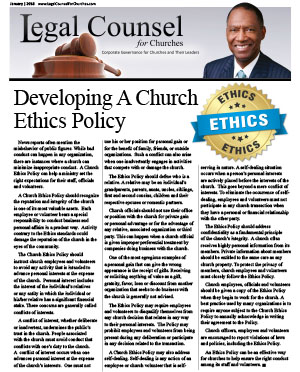News reports often mention the misbehavior of public figures. While bad conduct can happen in any organization, there are instances where a church can minimize inappropriate conduct. A Church Ethics Policy can help a ministry set the right expectations for their staff, officials and volunteers.
A Church Ethics Policy should recognize the reputation and integrity of the church is one of its most valuable assets. Each employee or volunteer bears a special responsibility to conduct business and personal affairs in a prudent way. Activity contrary to the Ethics standards could damage the reputation of the church in the eyes of the community.
The Church Ethics Policy should instruct church employees and volunteers to avoid any activity that is intended to advance personal interests at the expense of the church. Personal interest includes the interest of the individual’s relatives or any entity in which the individual or his/her relative has a significant financial stake. These concerns are generally called conflicts of interests.
A conflict of interest, whether deliberate or inadvertent, undermines the public’s trust in the church. People associated with the church must avoid conduct that conflicts with one’s duty to the church.
A conflict of interest occurs when one advances personal interest at the expense of the church’s interests. One must not use his or her position for personal gain or for the benefit of family, friends, or outside organizations. Such a conflict can also arise when one inadvertently engages in activities that compete with or damage the church.
The Ethics Policy should define who is a relative. A relative may be an individual’s grandparents, parents, aunts, uncles, siblings, first and second cousins, children and their respective spouses or romantic partners.
Church officials should not use their office or position with the church for private gain or personal advantage or for the advantage of any relative, associated organization or third party. This can happen when a church official is given improper preferential treatment by companies doing business with the church.
One of the most egregious examples of a personal gain that can give the wrong appearance is the receipt of gifts. Receiving or soliciting anything of value as a gift, gratuity, favor, loan or discount from another organization that seeks to do business with the church is generally not advised.
The Ethics Policy may require employees and volunteers to disqualify themselves from any church decision that relates in any way to their personal interests. The Policy may prohibit employees and volunteers from being present during any deliberation or participate in any decision related to the transaction.
A Church Ethics Policy may also address self-dealing. Self-dealing is any action of an employee or church volunteer that is self- serving in nature. A self-dealing situation occurs when a person’s personal interests are actively placed before the interests of the church. This goes beyond a mere conflict of interests. To eliminate the occurrence of self- dealing, employees and volunteers must not participate in any church transaction when they have a personal or financial relationship with the other party.
The Ethics Policy should address confidentiality as a fundamental principle of the church’s integrity. A church often receives highly personal information from its members. Private information about members should be entitled to the same care as any church property. To protect the privacy of members, church employees and volunteers must closely follow the Ethics Policy.
Church employees, officials and volunteers should be given a copy of the Ethics Policy when they begin to work for the church. A best practice used by many organizations is to require anyone subject to the Church Ethics Policy to annually acknowledge in writing their agreement to the Policy.
Church officers, employees and volunteers are encouraged to report violations of laws and policies, including the Ethics Policy.
An Ethics Policy can be an effective way for churches to help ensure the right conduct among its staff and volunteers.

